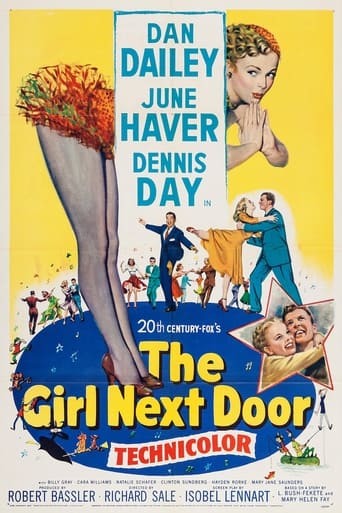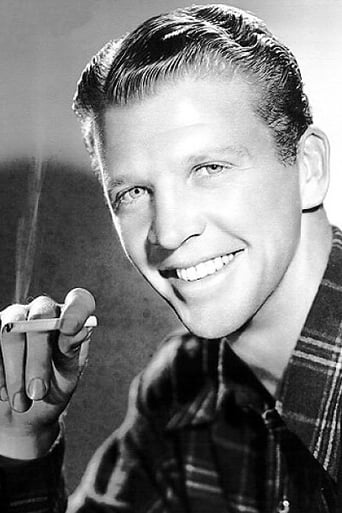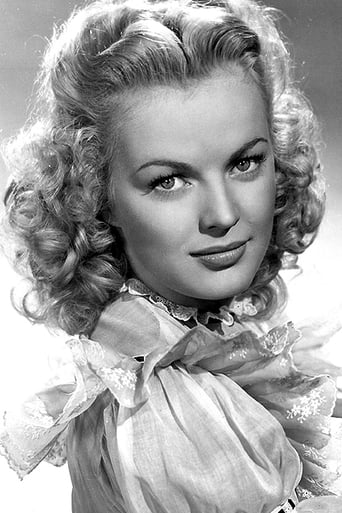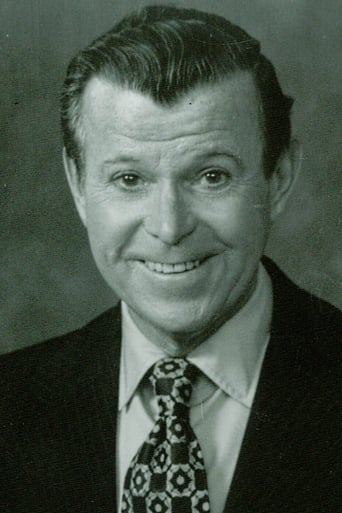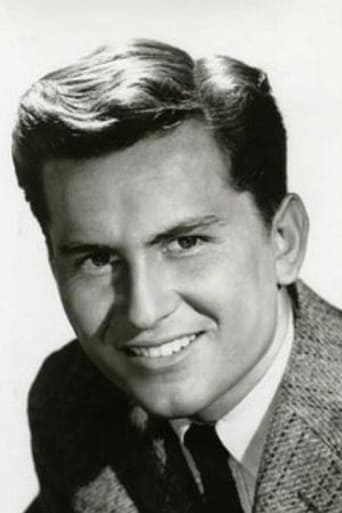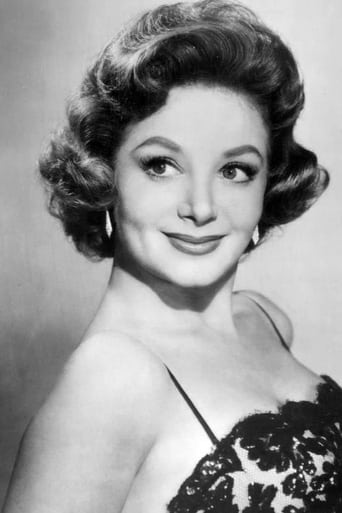Actuakers
One of my all time favorites.
Btexxamar
I like Black Panther, but I didn't like this movie.
Afouotos
Although it has its amusing moments, in eneral the plot does not convince.
Marva-nova
Amazing worth wacthing. So good. Biased but well made with many good points.
weezeralfalfa
This fun contemporary musical marked the end of an era for Fox musicals. It was the last of 5 films in which versatile likable Dan Dailey starred as the leading man with one of Fox's two blond leading ladies of '40s and early '50s musicals: Betty Grable and June Haver. This was June's last Hollywood film, after a string of mostly Fox or Warner musicals since '44. It was also singer Dennis Day's last Hollywood film. Finally, it was the last Fox film scored by composer Josef Myrow and lyricist Mack Gordon, who began collaborating on a number of Fox musicals beginning in '46, after Gordon's previous primary collaborator, Harry Warren, left Fox for MGM.Actually, Fox wanted Betty Grable to once again star opposite her favorite leading man for musicals. But, she turned it down. Thus, June served the purpose for which she was originally signed: as a backup for Betty, in case she couldn't or wouldn't do a film. Happily, we see that Dan and June also had super chemistry, bringing a high intensity of energy to the film. This is perhaps best exhibited by their unique spectacular 'mating dance', which provides a fitting finale to their whirlwind romance. Actually, its clear to me that they made a more dynamic pair than Betty and DanUnlike most of June's and many of Betty's previous musicals, which had nostalgic themes of the gay '90s through '20s, this film was set in contemporary suburbia, which was mushrooming in the years following WWII. Thus, we have spacious modern houses close to each other, but with backyards were parties and cookouts are hosted. Unlike most of June's other Fox musicals, there is no other significant female musical star to share the musical spotlight with. Also, unlike most Fox musicals of the '40s, most of the dancing and singing is done off-stage. Aside from the opening chorus girl number, the major exception is the imaginative film-noire-like song and dance to "Nowhere Guy": very different in mood to the effervescent other musical numbers: something that looks like it belongs in an MGM Kelly or Astaire-dominated film. The dream dance, involving Dan, June, and Dan's son, as well as several animated cartoon portions, also look more like MGM features, than Fox. The chief choreographer was Richard Barstow, whose only other film credits as such were for "A Star is Born" and "the Greatest Show on Earth" : 2 quite prominent films for their times. The musical director was Lionel Newman: brother of the more famous Alfred Newman. Marilyn Monroe, whose star was rapidly rising at this time, requested Lionel to be the musical director in all her films.The central drama of the film revolves around Dan's son's(Joe) strong opposition to admitting a female into his cozy life as a father and son family vs. the obvious strong attraction between Dan's and June's characters(Bill and Jeannie).. Obviously, Joe is still at that age where girls around his age are often considered boring and clumsy at things he's interested in(like fishing trips in the woods). He emphatically lets his wannabe girlfriend(Kitty) and stepmother (Jeannie) know about his profound disinterest in them. At first, Jeannie thinks she can bring Joe around to accepting her, then decides this isn't likely, and berates Bill for trying to badger Joe into changing his attitude toward her. She decides it's better if she moves away, until Joe belatedly offers some words of peace, causing her to delay her hasty plan, bolstered by the advice of her friends Reed(Dennis Day) and Rosie(Cara Williams). But, in the end, after the Bill-Jeannie crisis is resolved, when Kitty asks Joe if he will marry her when they grow up, she gets an emphatic arrogant "no", showing that Joe's dislike of girls(at least Kitty) has not budged.For the most part, laconic Bill provided a calming effect on the hyperkinetic social butterfly nightclub entertainer Jeannie, which is probably one reason she immediately fell for him, along with his obvious song and dance talent and domestic skills. Joe and Kitty provide characters that children can somewhat identify with. However, their dialogue with each other is often very awkward. ..The dish juggling act between Bill and Joe, accompanied by the song "I'd Rather Have a Pal Than a Gal", is a very clever scene, emphasizing their great relationship, and the lack of need for a woman to do household chores. However, after Joe goes to bed, Bill says, at times, he would like to reverse the "gal" and "pal" in the song: providing an opening for Jeannie. Bill's profession as a cartoonist provides a largely at-home job for a single father, and also leads into the several animated cartoon segments, which presumably mainly appeal to the children in the audience.Many viewers today are put off by Dennis Day's rather formal, if usually cheery, persona and formal attire, and his traditional Irish tenor singing, as contrasted with Dan's Gene Kelly style. I don't have a problem with him, certainly compared to Jeannie's comically super stiff and arrogant butler! Cara Williams, as his bright-eyed carrot-haired girlfriend, provides some distraction from June's dominance.
moonspinner55
Candy-colored, candy-coated musical comedy from Fox with lots of effervescence and wiseacre pizazz. June Haver plays globe-trotting musical starlet who buys her first (rather beautiful) home in Scarsdale and, despite some reservations ("Frankenstein slept here!"), she moves right in and throws a party; the widower next door quickly becomes the main attraction in her life, but his young son isn't so happy about having to compete with this female interloper ("I'd rather have a buddy than a female fuddy-duddy anytime," his dad lies to him). Surprisingly funny, lively, studio-set suburban shenanigans has more songs than "Tommy", yet the choreography is rather intricate and the cast is full of joshing good cheer. Haver's new beau Dan Dailey soft-shoes through with a big goofy grin; Cara Williams is June's tippling best friend who pairs off (rather unconvincingly) with tenor Dennis Day, who sings to the rafters (literally); Billy Gray is Dailey's son, who has an excellent dramatic scene at the police station. Notable for two animated sequences (courtesy UPA), as well as a lovely fantasy number where Dailey is forced to choose between his son and his new sweetheart. Not quite in the same class as MGM's musical entries from this era, but a lot of jovial fun. **1/2 from ****
Andrew Schoneberg
This obscure film was a treat for me, a classic film buff; it's a rare musical from Hollywood's golden age that's I've never seen nor even heard of. The Girl Next Door is not only very well made and entertaining, but in 1951 this was cutting edge both in story and in the way it's musical numbers are staged.Plotwise, it's a mild domestic drama, coupled with a conventional romance. Innovative is that the story portrays a warm, friendship-based father-son relationship which functions very well without a mother or other woman being around. When the father falls for the professional singer-dancer woman next door, the son is resentful.The dance numbers are not only well staged and performed, but refreshingly creative. The standout is a film-noirish number, shot with highly stylized camera angles, stark lighting, highly effective use of contrasting colors, and slinky jazz dance moves. The capper is that the number is supposed to be a nightclub performance with Dan Daily in the audience; mid-number, he imagines himself into the number, first as a shadow and then as the primary male dancer (a la "The Purple Rose of Cairo", decades later). The film's opening is remarkable for it's time; credits are superimposed (very unusual for the time) on the first of a three song extended musical number which immediately set's up the story and gives us a lot of information about June Haver's character.Dan Daily is likable, charming, masculine, believable, as well as being a good enough dancer and singer. June Haver is sexy in a very wholesome way, has a great body, moves well, but is somewhat bland in the personality-acting department. Her singing is dubbed. The only weakness in the film are that Denis Day is barely mediocre as a comic second banana, though his singing is beautiful, if you like old fashioned Irish tenor vocalizing. Cara Williams is radiant and sassy in the typical role of wisecracking friend of the heroine, but she's given little screen time and the zingers she's given to say are bland. Otherwise the dialog is far above the norm for musicals of it's era.The DVD includes 3 documentary featurettes; 2 are very informative and well done, one is about the film and the other about Dan Daily. The third is about Billy Gray (Bud of "Father Knows Best"), it's hampered by not having any footage from non-Fox films he made, nor from the classic TV show.
reelguy2
As of this writing, the IMDb user rating for this unpretentious musical is an amazingly high 8.3 - higher than The Band Wagon also released in 1953. So what accounts for such a rating? Most of the songs are awful ("I'd rather have a pal than a gal, anytime" is an example), and the choreography is just so-so. But despite these deficiencies, The Girl Next Door is one of the most amiable entertainments from the '50s. The slight story is played with humor and warmth by the entire cast. The dialog is bright. The modest fashions and decor make this a fascinating time capsule - closer to early 50s suburbia than the highly stylized productions from MGM.Although it's not about to supplant The Band Wagon from a critical standpoint, this film does weave a particular magic and has obviously won its way into a lot of hearts - mine included!
